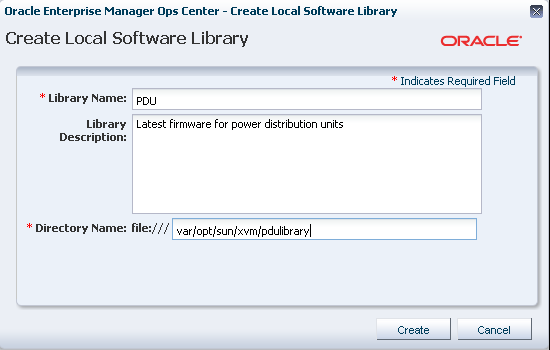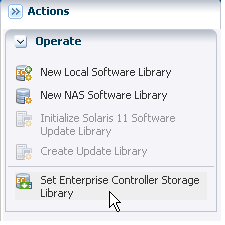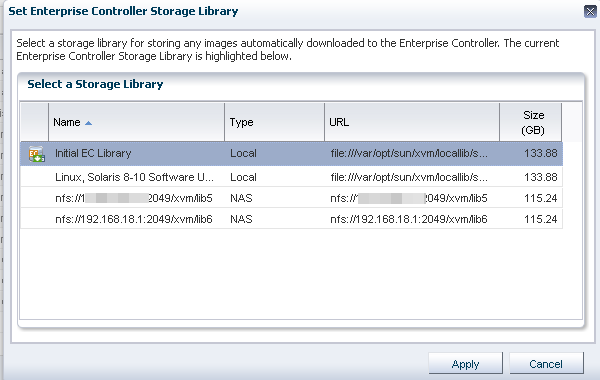Oracle® Enterprise Manager Ops Center
Configure and Manage Libraries on the Enterprise Controller
12c Release 3 (12.3.0.0.0)
E62131-01
June 2015
This guide provides an end-to-end example for how to use Oracle Enterprise Manager Ops Center.
Introduction
A software library stores images for operating systems and firmware. When you apply a deployment plan that provisions an operating system or firmware, Oracle Enterprise Manager Ops Center retrieves the images from a software library.
A software library that resides on a file system of the system where the Enterprise Controller is installed is a local software library. When Oracle Enterprise Manager Ops Center is in Connected mode, the EC Library accepts downloaded images from Oracle web sites and vendor web sites. When the product software is installed, one local software library is the Initial EC Library.
As a storage administrator, you can create more software libraries to store images and you can create storage libraries to store virtualization metadata. This document describes how to create a local software library that accepts routine download operations.
See Related Articles and Resources for links to related information and articles.
What You Will Need
You will need the following to create and maintain a local software library:
-
Full path name to the file system.
-
You must have the role of Storage Admin to create libraries.
Creating and Maintaining a Software Library
The following tasks create a new local software library that accepts the routine download operations:
Creating a Local Library
The software library is a location in the file system of the Enterprise Controller's host system. In this step, specify the location.
-
Expand Libraries in the Navigation pane.
-
Click New Local Software Library in the Actions pane.
-
Enter a unique name and description.
-
In the Directory Name field, enter the location of the file system.

Description of the illustration locallib_create_pdu.png
-
Click Create.
When the job is completed, you can see the new software library in the Libraries section of the Navigation pane in the Software Libraries section.
Designating the Software Library for Automatic Downloads of Images
The Enterprise Controller always has one software library to store the new versions of images. At any time, you can specify a different software library as the default library.
-
Expand Libraries in the Navigation pane. The current software library is identified by its badge, a white down arrow on a green background.

Description of the illustration defaultlib_badge.png
-
Click Software Libraries.
-
Click Set Enterprise Controller Storage Library in the Actions pane.

Description of the illustration swlib_set.png
The display lists all of the libraries and the current library is highlighted.

Description of the illustration swlib_setscreen.png
-
Click the new software library.
-
Click Apply.
When the job is completed, the software library you selected is now the EC Storage Library. To view the contents of the software library at any time, expand the Libraries section and select the library with the Enterprise Controller badge. The Library Contents table in the center pane lists the images.
What's Next?
To use firmware images, see Keep Your Firmware Up-to-Date in the Operate How To library at http://docs.oracle.com/cd/E59957_01/nav/operate.htm.
To use the library as a storage library for virtualization metadata, see the documents for creating server pools in the Deploy How To library at http://docs.oracle.com/cd/E59957_01/nav/deploy.htm
Related Articles and Resources
See Configure Software Libraries in Oracle Enterprise Manager Ops Center Configure Reference.
For end-to-end examples, see the workflows and how to documentation in the library. For deployment tasks, go to http://docs.oracle.com/cd/E59957_01/nav/deploy.htm and for operate tasks go to http://docs.oracle.com/cd/E59957_01/nav/operate.htm.
Documentation Accessibility
For information about Oracle's commitment to accessibility, visit the Oracle Accessibility Program website at http://www.oracle.com/pls/topic/lookup?ctx=acc&id=docacc.
Oracle customers that have purchased support have access to electronic support through My Oracle Support. For information, visit http://www.oracle.com/pls/topic/lookup?ctx=acc&id=info or visit http://www.oracle.com/pls/topic/lookup?ctx=acc&id=trs if you are hearing impaired.
Oracle Enterprise Manager Ops Center Configure and Manage Libraries on the Enterprise Controller , 12c Release 3 (12.3.0.0.0)
E62131-01
Copyright © 2007, 2015, Oracle and/or its affiliates. All rights reserved.
This software and related documentation are provided under a license agreement containing restrictions on use and disclosure and are protected by intellectual property laws. Except as expressly permitted in your license agreement or allowed by law, you may not use, copy, reproduce, translate, broadcast, modify, license, transmit, distribute, exhibit, perform, publish, or display any part, in any form, or by any means. Reverse engineering, disassembly, or decompilation of this software, unless required by law for interoperability, is prohibited.
The information contained herein is subject to change without notice and is not warranted to be error-free. If you find any errors, please report them to us in writing.
If this is software or related documentation that is delivered to the U.S. Government or anyone licensing it on behalf of the U.S. Government, then the following notice is applicable:
U.S. GOVERNMENT END USERS: Oracle programs, including any operating system, integrated software, any programs installed on the hardware, and/or documentation, delivered to U.S. Government end users are "commercial computer software" pursuant to the applicable Federal Acquisition Regulation and agency-specific supplemental regulations. As such, use, duplication, disclosure, modification, and adaptation of the programs, including any operating system, integrated software, any programs installed on the hardware, and/or documentation, shall be subject to license terms and license restrictions applicable to the programs. No other rights are granted to the U.S. Government.
This software or hardware is developed for general use in a variety of information management applications. It is not developed or intended for use in any inherently dangerous applications, including applications that may create a risk of personal injury. If you use this software or hardware in dangerous applications, then you shall be responsible to take all appropriate fail-safe, backup, redundancy, and other measures to ensure its safe use. Oracle Corporation and its affiliates disclaim any liability for any damages caused by use of this software or hardware in dangerous applications.
Oracle and Java are registered trademarks of Oracle and/or its affiliates. Other names may be trademarks of their respective owners.
Intel and Intel Xeon are trademarks or registered trademarks of Intel Corporation. All SPARC trademarks are used under license and are trademarks or registered trademarks of SPARC International, Inc. AMD, Opteron, the AMD logo, and the AMD Opteron logo are trademarks or registered trademarks of Advanced Micro Devices. UNIX is a registered trademark of The Open Group.
This software or hardware and documentation may provide access to or information about content, products, and services from third parties. Oracle Corporation and its affiliates are not responsible for and expressly disclaim all warranties of any kind with respect to third-party content, products, and services unless otherwise set forth in an applicable agreement between you and Oracle. Oracle Corporation and its affiliates will not be responsible for any loss, costs, or damages incurred due to your access to or use of third-party content, products, or services, except as set forth in an applicable agreement between you and Oracle.